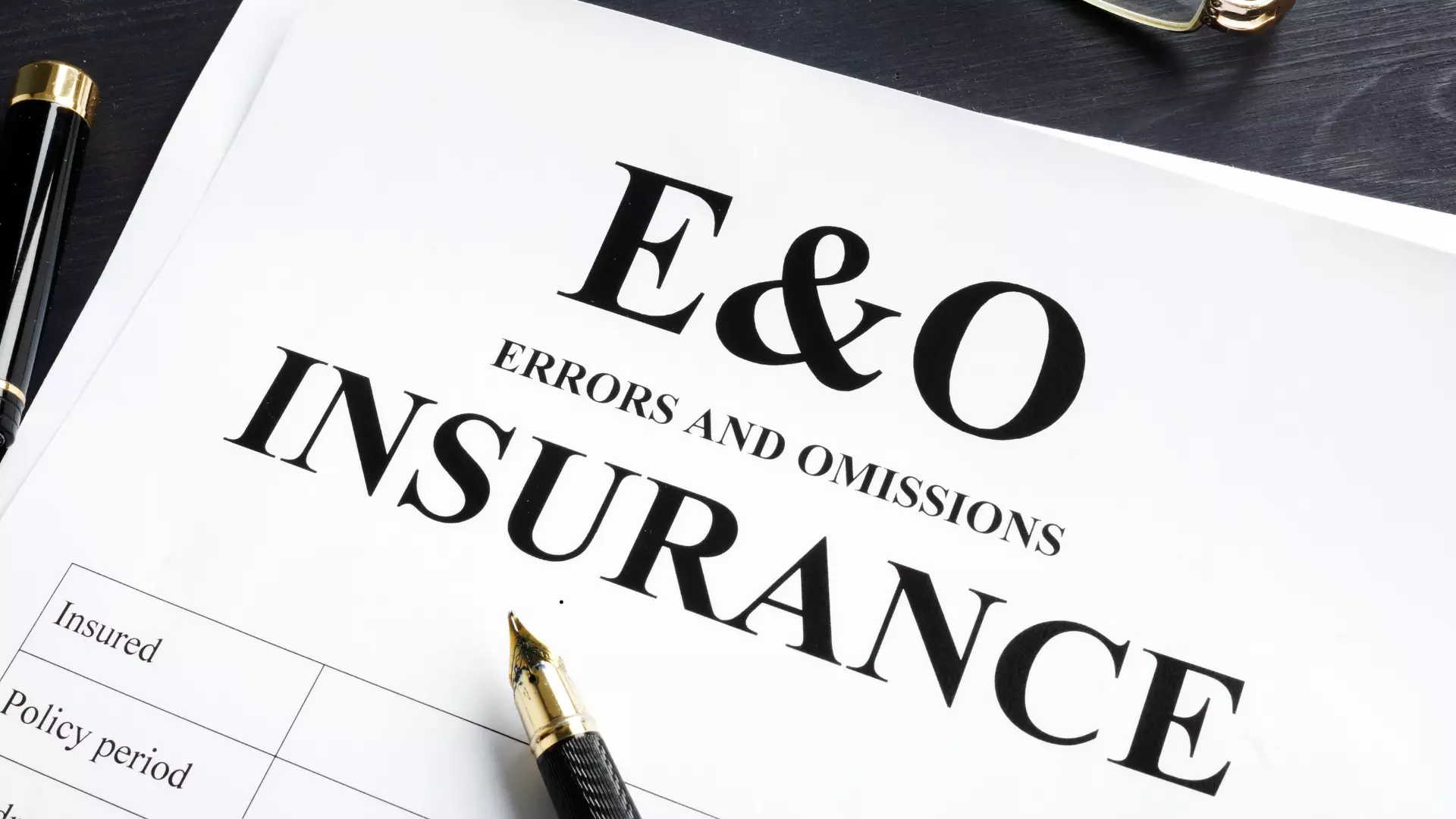Errors and Omissions Insurance for Bookkeepers
Every business needs accurate bookkeeping to comply with various regulations and maintain financial accuracy. Unfortunately, bookkeepers can make mistakes or even misinterpret financial records, exposing themselves to potential lawsuits.
Errors and Omissions Insurance for Bookkeepers, also known as Professional Liability Insurance, provides coverage against claims of negligence, misrepresentation, or failure to deliver professional services as agreed.
It offers financial protection against being held liable for professional shortcomings.
What is Errors and Omissions Insurance?
Errors and Omissions (E&O) insurance is a type of liability coverage designed to protect bookkeepers from financial losses due to mistakes made while performing their professional duties.
If the damages result from the insured’s negligence, the policy covers all legal fees arising from E&O claims, settlements, and court costs.
Why Should Bookkeepers Have Errors and Omissions Insurance?
E&O insurance is essential for bookkeepers who manage sensitive financial data since even the smallest mistake can result in significant financial losses.
Here are some reasons to obtain this coverage:
Protection Against Legal Claims
Every bookkeeper can be sued by clients for mistakes such as incorrect reporting or failing to meet deadlines. E&O Insurance not only protects against errors but also covers all legal defense expenses and representation fees, which can be significantly high.
Maintains Professional Credibility
Being insured demonstrates professionalism and instills confidence in clients.
Regulatory Compliance
In some states or industries, bookkeepers may be legally required to carry E&O insurance to operate.

What Does Errors and Omissions Insurance Cover?
E&O insurance policies vary, but most cover the following:
Negligence and Professional Mistakes
If a bookkeeping error, such as incorrect tax filings or account reconciliations, results in client losses, the policy covers the necessary expenses.
Legal Fees and Settlements
Attorney fees, court costs, and settlements ordered by a judge or agreed upon outside of court are covered by E&O insurance.
Misrepresentation and Breach of Contract
A client may claim that a bookkeeper failed to fulfill contractual obligations or misrepresented their bookkeeping services. These claims are covered under this insurance.
Cyber Liability and Fraud Protection
This policy includes coverage for fraud and security breaches associated with handling sensitive financial data. Some E&O policies cover the costs of data breaches.
What Errors and Omissions Insurance Does NOT Cover?
E&O insurance does not provide coverage for
- Intentional illegal actions or fraud
- General liability claims such as bodily injury or property damage
- Disputes related to discrimination or employee conflicts
- Acts committed before the policy coverage period
How Much Does Errors and Omissions Insurance Cost for Bookkeepers?
Several factors determine the cost of E&O insurance for bookkeepers, including:
Business and Revenue
Higher income can lead to higher premiums.
Risk Level
The more complex the bookkeeping services, the higher the risk and cost.
Policy Limits and Deductibles
Higher coverage limits increase costs, while higher deductibles lower premiums.
Claims History
A history of claims typically results in higher premiums.
On average, bookkeepers spend between $300 and $1,500 per year on standard E&O insurance coverage.
How to Choose the Right E&O Insurance Policy
To select the best errors and omissions insurance, policies should be thoroughly analyzed. Consider the following:
Coverage Limits
Ensure your policy meets the financial requirements of your bookkeeping business based on its size and scope.
Industry-Specific Protection
Bookkeepers working in specialized fields like healthcare or real estate may need additional coverage.
Insurance Provider Reputation
Choose an insurance company known for strong financial stability and fair claims handling.
Policy Exclusions
Review exclusions to ensure there are no gaps in coverage that could leave you vulnerable.
Optional Cyber Liability Insurance
Given the rise in data breaches, consider adding cyber liability insurance for extra protection.
Steps to Obtain Errors and Omissions Insurance
Assess Your Risks
Identify potential liabilities associated with your bookkeeping services.
Get Multiple Quotes
Request estimates from different insurance providers to compare coverage options and costs.
Review Policy Terms
Examine the potential policy’s conditions, exclusions, and coverage limits.
Work with an Insurance Agent
A qualified insurance agent can help find the best policy tailored to your needs.
Errors and Omissions insurance protects bookkeepers by providing financial security and legal defense. Whether you are a freelance bookkeeper or part of a large financial services firm, having this insurance ensures peace of mind and shields you from excessive legal scrutiny. The right policy safeguards your business, reputation, and financial stability in the long run.

Frequently Asked Questions (FAQs)
What Does Errors and Omissions Insurance Cost?
The cost of Errors and Omissions (E&O) insurance varies based on several factors, including the industry, coverage limits, company size, revenue, and claims history. On average, small businesses pay between $500 and $2,000 per year for E&O insurance, with premiums typically ranging from $40 to $170 per month. Bookkeepers and accountants may find their premiums on the lower end if they have a clean claims history and operate with a lower risk profile. Higher coverage limits, additional endorsements, or working with high-risk clients can increase costs.
What Are the Liabilities of a Bookkeeper?
Bookkeepers have various liabilities related to financial reporting and recordkeeping. Some of the primary risks include:
Data Entry Errors
Mistakes in recording transactions can lead to financial discrepancies and potential legal action.
Failure to Meet Deadlines
Missing tax filing deadlines or other regulatory requirements can result in fines and penalties for clients.
Misclassification of Expenses
Incorrectly categorizing expenses can lead to inaccurate financial statements or tax filings.
Breach of Fiduciary Duty
Mishandling client funds or failing to provide accurate financial reporting can result in lawsuits.
Negligence Claims
If a bookkeeper makes a mistake that causes a financial loss for a client, they may be held legally responsible.
To mitigate these risks, bookkeepers should maintain professional liability insurance (E&O insurance), follow strict internal controls, and stay updated on tax and accounting regulations.
What Is an Example of Errors and Omissions Insurance?
An example of E&O insurance in action involves a bookkeeper who miscalculates a company’s payroll taxes. Suppose a bookkeeper accidentally underreports payroll taxes, causing the business to incur IRS penalties and interest. The client sues the bookkeeper for negligence. E&O insurance would cover legal fees, settlements, and any required corrections to resolve the issue, helping protect the bookkeeper from financial loss.

Do Bookkeepers Need Cyber Insurance?
Yes, bookkeepers should strongly consider cyber insurance. Since they handle sensitive financial data, including tax records, payroll details, and banking information, they are prime targets for cyber threats. Cyber insurance helps cover:
Data Breaches
If a hacker gains access to client financial data, cyber insurance can cover the costs of notification, credit monitoring, and legal fees.
Phishing and Fraud
If a bookkeeper is tricked into transferring funds or providing credentials, cyber insurance can help mitigate losses.
Ransomware Attacks
Cyber insurance can cover costs associated with ransomware demands and recovery efforts.
Network Security Failures
If a bookkeeper’s system is compromised, leading to unauthorized access to client data, cyber insurance can assist with forensic investigations and system restoration.
Given the increasing risks of cyberattacks, bookkeepers should have both E&O insurance and cyber liability insurance to protect their business and clients.








